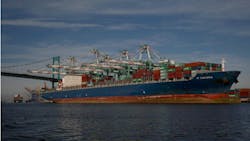The desire to avoid potential disruptions after the labor contract with West Coast dockworkers expires will drive import volume up by 7.5 percent at major U.S. container ports in June, according to the monthly Global Port Tracker report released by the National Retail Federation and Hackett Associates. Retailers are bringing unusually high quantities of merchandise into the country early, the report states.
“We don’t want to see disruptions at the ports but retailers are making sure they are prepared in case that happens,” said Jonathan Gold, NRF vice president for supply chain and customs policy. “Whether it’s bringing cargo in early or other contingency plans, retailers will keep the shelves stocked for the back-to-school and holiday seasons.”
The Pacific Maritime Association and the International Longshore and Warehouse Union began negotiations last month on a new contract to replace the agreement that expires June 30. NRF has urged both sides to avoid any disruptions that could affect the flow of back-to-school or holiday merchandise.
West Coast ports handle more than two-thirds of U.S. retail container cargo, including the bulk of cargo from Asia. The last major coast-wide shutdown there occurred in the fall of 2002, closing ports for 10 days and creating a months-long backlog to be cleared.
U.S. ports followed by Global Port Tracker handled 1.43 million Twenty-Foot Equivalent Units in April, the latest month for which after-the-fact numbers are available. The number was up 9.9 percent from March and 10.3 percent from April 2013. One TEU is one 20-foot cargo container or its equivalent.
May was estimated at 1.47 million TEU, up 5.8 percent from the same month last year, and June is forecast at 1.46 million TEU, up 7.5 percent from last year. Both are unusually high numbers not normally seen until later in the summer or fall, a sign that retailers have begun bringing imported merchandise into the country early because of the uncertainty of what could happen when the labor contract expires.
July is forecast at an even-higher 1.51 million TEU, up 4.4 percent from last year; August at 1.52 million TEU, up 1.9 percent; September at 1.45 million TEU, up 0.8 percent; and October at 1.48 million TEU, up 3.4 percent.
The first half of the year is expected to total 8.3 million TEU, up 6.5 percent over last year. The total for 2013 was 16.2 million TEU, up 2.3 percent from 2012’s 15.8 million TEU.
The import numbers come as NRF is forecasting 4.1 percent sales growth in 2014. Cargo volume does not correlate directly with sales but is a barometer of retailers’ expectations.
Hackett Associates Founder Ben Hackett said inventory levels were up earlier in the year as a severe winter kept shoppers at home and retailers began stocking up in advance of the port negotiations.
“The weather is behind us and inventories are coming down as the consumer ventures out and West Coast dockworkers and management remain at the bargaining table,” Hackett said. “The real question is how long can the economic expansion continue?”
